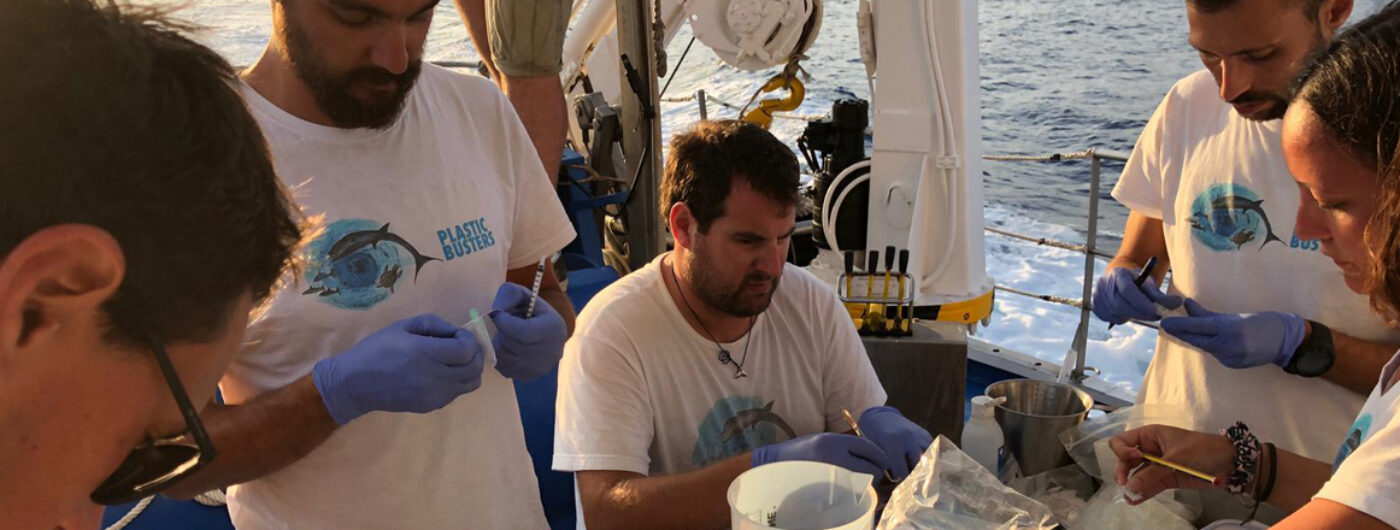
Plastic Busters: preventing, reducing and removing marine litter from the Mediterranean
The Plastic Busters project has a remarkable objective: to tackle the issue of marine litter in the Mediterranean. Over the last four years, this Union for the Mediterranean-supported project has worked towards this goal in both the Northern and Southern Mediterranean regions by addressing the whole lifecycle of marine litter waste management. We spoke with two key figures within the Plastic Busters initiative, Professor Cristina Fossi, Professor at the University of Siena and Plastic Busters Director; and Doctor Thomais Vlachogianni, Programme/Policy Officer at MIO-ECSDE.
In the Mediterranean sea, 80% of marine litter is made from plastic (including microplastics). What’s more, waste generation in the southern Mediterranean region has grown approximately 15% over the last decade, mostly due to a growing population and increased consumption. As Professor Cristina Fossi puts it:
“The Mediterranean is a closed sea, so anything that impacts the North affects the South [and vice versa]. We strongly believe that only if all countries work together can we really obtain the final goal of reducing marine litter in the Mediterranean.”
Having begun in 2013, Plastic Busters is now present in over ten countries throughout the Mediterranean. The project has a wide scope of activities, as described by Professor Fossi: “not just monitoring or mitigation but the entire lifecycle [of marine litter], from monitoring, identifying the impact on biodiversity and hotspot areas, analysis of the impact and developing mitigation actions.” Plastic Busters also has a role as “the science-policy interface, to transfer this information to governments and to define specific mitigation actions that can be [transferred into law].” As Doctor Vlachogianni points out, one of the project’s proudest achievements has been the “recognition from the 42 Mediterranean countries regarding the urgency of the [marine litter] problem and the agreement to join forces for a coordinated regional approach.”
As well as reinforcing to pan-Mediterranean coordinated action against marine litter, Plastic Busters has also contributed to the development of both protective legislation and a tangible commitment at European level. All EU Member States have signed up to reach a measurable limit of “20 items [of litter] per 100m stretch [of coastline]”, which is all the more impressive as currently only 15% of the studied European beaches meet this threshold.
The Plastic Busters project is no stranger to achieving its goals, despite having weathered many ups and downs since its modest beginnings in 2013. As Professor Fossi admits, the whole project has been an “odyssey”, with the initial search for funding giving her many sleepless nights. However, now Plastic Busters is positively impacting the entirety of the marine litter lifecycle, from working with the Mediterranean tourist industry to reduce the amount of single-use plastics at beach bars to working with the fishing industry to organise better aquaculture waste management, particularly of mussels nets. As well as working directly with key stakeholders in the Mediterranean, including those whose livelihood depends on proximity to coastal regions, Plastic Busters also supports “Adopt a Beach” programmes throughout the Mediterranean, where communities work to clean up and look after their local beaches.
Given the multi-national nature of the Plastic Busters initiative, both Professor Fossi and Doctor Vlachogianni admitted that the project has been slowed down by the impact of COVID-19, as project stakeholders were not able to do fieldwork, lab research or to meet in order to share findings. However, the project has received extensions for the much-needed field research, and pilot projects are now taking place again. COVID-19 also presents another challenge for Plastic Busters, as “the necessity of using gloves and masks (PPE)… somehow ends up in the coastal and marine environment.” As Doctor Vlachogianni states, “we just have to find a solution to make sure [PPE] does not end up in the marine environment.”
This adaptability and tendency to rise to new challenges has contributed to Plastic Busters’ success from the start. In this way, another remarkable aspect of the project is the proportion of women who hold leadership positions in the project. Both Professor Fossi and Doctor Vlachogianni are proud of the predominance of women in their area of STEM (Science, Technology, Engineering and Mathematics), and proudly shared that their female colleagues will be featured in a short documentary about the role of women in their field. As well as actively promoting women in the field of environmental chemistry, the Plastic Busters project also funds multiple researchers early in their careers, with upwards of ten PhD researchers being fully funded by the project in each of the Mediterranean countries where Plastic Busters is present.
When asked about hopes for the future of the project, Professor Fossi reiterated that
“One of the dreams of the Plastic Busters project is to bind together the South and the North in order to reach the main goal to reduce the impact of marine litter on biodiversity in the entire Mediterranean.”
Doctor Vlachogianni agreed, adding that she would “also like to see the continuation of the project in the direction of expanding and upscaling the piloting of solutions.” With pilot projects successfully tested in Italy, Spain, France, Greece, Croatia and Albania, and these methodologies currently being implemented in Tunisia and Lebanon, the Plastic Busters project is doing everything in its power to reach its ambition to tackle marine litter. From the early tenacity of its academic founders to secure funding to its continuing commitment to ambitious goals despite the COVID-19 pandemic, the project is truly transforming the health of the Mediterranean, and uniting the whole Mediterranean region in pursuit of this goal.
Project: PLASTIC-BUSTERS for a Mediterranean free from litter
